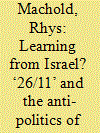| Srl | Item |
| 1 |
ID:
185077


|
|
|
|
|
| Summary/Abstract |
Within recent critical debates about the geographies and circulations of counterinsurgency knowledge, scholars have focused primarily on dominant centres of power and authority in the global North. Building a framework drawn from critical geography, this article decentres these locations and actors by exploring the global production and circulation of counterinsurgency knowledge from the vantage point of Indian strategic thinkers. Focusing on the work of the Indian think tank the Institute for Conflict Management (ICM), the article traces how Indian counterinsurgency knowledge has been produced, packaged and circulated transnationally since the late 1990s. It argues the power and utility that forms of counterinsurgency knowledge command – Indian or otherwise – are never reducible to the essential features of what actors or texts say. Rather, it suggests that counterinsurgency knowledge is produced through particular relations and locations of power-knowledge that define what they represent and where they fit in. It theorizes forms of counterinsurgency knowledge as positions within broader transnational forces, entwined with colonial histories of pacification. In doing so, it illuminates the contestations and forms of work involved in staging or organizing the world through practices that make some forms, actors, and locations important and relegate others to the peripheries of global politics.
|
|
|
|
|
|
|
|
|
|
|
|
|
|
|
|
| 2 |
ID:
147319


|
|
|
|
|
| Summary/Abstract |
This article calls for a greater emphasis on issues of politics and anti-politics within critical debates about transnational security governance in the metropolis. While scholars have documented the growing popularity of policy ‘models’ and ‘best practices’ in policing and urban security planning, we know little about what makes these schemes attractive to the officials who enroll in them. I take the government of Maharashtra’s decision to ‘learn from Israel’ following the 2008 Mumbai attacks (26/11) as an invitation to re-evaluate the relationships among policymaking, politics, and depoliticization. Focusing on references to Israeli security know-how as a ‘best practice’ by Maharashtra state officials, I explore how an association with Israel was used to negotiate the conflicts and controversies that followed 26/11. The article has two aims: first, it addresses how transnational policy schemes work anti-politically within particular local contexts. Second, it locates counter-terrorism policy as a form of performative politics, which is generative of policy problems. In doing so, the article helps to reclaim the political contingency of policy responses to terroristic violence and addresses the agency of policy actors in the global South.
|
|
|
|
|
|
|
|
|
|
|
|
|
|
|
|